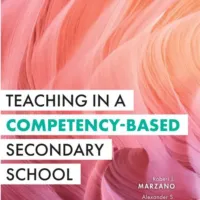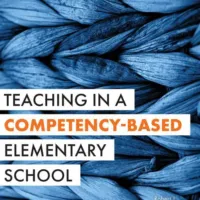
By Dr. Paul Wright, Marzano Academies Faculty Member
Editor’s note: the terms Standard Based and Competency Based have been interchangeably used
within research articles.
Early Research on Traditional Grading Systems
Educational practitioners and researchers have known the limitations of the traditional 100-point grading scale for at least fifty years. Yet this scale and its associated alpha-reporting scheme (A, B, C) are as entrenched in our education system as much as the outmoded 180-day school year (Ripley, 2014). Brookhart (2016) noted that educators in the 1970s assigning numeric values to complex student performance struggled with differentiating student academic performance that warranted an 89 or B, versus academic performance that earned a 90 or an A. These considerations were of paramount concern to students, but teachers often resorted to grade inflation or deflation tactics to add or conversely subtract points to complete a student’s grade report. Historically, traditional grading scales were susceptible to grade inflation and deflation, albeit by well-meaning teachers’ misguided use of adding extraneous measures to a student’s grade report such as attendance, punctuality, or homework completion (Griffin, 2021). These common grading misuses, while well-intended, distracted from accurately assigning scores to identified academic tasks. It became clear decades ago that teachers were not necessarily assigning student academic performance grades that corresponded to discrete tasks. Grades and grading systems became a hodgepodge of academic performance, behavioral rewards or demerits and schemes to round numbers up or down based on a litany of non-academic factors.
The Shift Toward Meaningful and Accurate Grading Systems, The Rise of Competency Based Education
Teachers began exploring and experimenting with alternatives to traditional grading methods in the late 1970s and the 1980s with a shift toward discovering authentic measures of student performance, ones which tied evaluation to learning and desired outcomes. Educators explored intrinsic knowledge evaluation methods through demonstration, versus recitation (Huntley, 1976). Researchers began to advocate those desired academic outcomes (objectives) be tied to instruction and student evaluation be a clearly defined and a transparent process without added behavioral components like punctuality or appropriate behavior, although those skills could be evaluated independently (Taylor,1979). Early adopters of defining academic outcomes or competencies and tying instruction to desired outcomes in a transparent and systematic way occurred within nontraditional subject areas like vocational education (Henrico County Schools, 1984). Through the mid-1980s and 1990s within education research literature reviews one begins to see the terms Competency-Based Education (CBE) and Standards-Based Education applied to transparent, accurate and meaningful grading procedures. The nascent field of CBE in the late 1990s and early 2000s yielded a significant amount of positive research related to how students and teachers believed CBE procedures created more meaningful grades (Jung, 2009).
Researchers highlighted how CBE systems provided more meaningful grading experiences for students and teachers, and that CBE grades became a better predictor of classroom grades (McDaniel, 2010) and (Marzano, 2011). CBE research conducted in the 2000s through the 2010s concluded that high-quality CBE programs provided more evaluation transparency for the student and teacher and, when implemented properly, led to a greater understanding of topics and more accurately predicted end-of-course academic achievement scores than traditional grading systems.
Burgeoning Research on Competency-Based Scoring
Research conducted during the early 2000s and 2010s indicated CBE systems of reporting yielded greater predictability between student daily performance and eventual end-of-course grades (Haptonstall, 2010). The question going forward now becomes can Competency-Based Education systems accurately predict student academic performance externally (outside-the system) through demonstrated performance on state exams and or workplace examinations? Thus far, the encouraging answer is yes. Research conducted by Welsh (2013) concluded there was a moderate degree of grade-test score convergence observed in classrooms using standards-based report cards and that standards-based report cards provided clarity and detail for both the learner and teacher. Additionally, research conducted by Haptonstall (2010) concluded that schools implementing high-quality standards based or competency-based education systems showed significant correlation between student grades and state assessment test scores. Research conducted by Lehman (2018) reinforced earlier findings by Welsh, that standards-based grading provided an accurate description of student academic performance, which allowed teachers to communicate student achievement more accurately with students, parents, and other educators. Additionally, Lehman (2018) noted that correlations between standards-based grading and end of-year math examinations were larger than correlations between traditional grades and end-of year examination scores. Research results of standards-based (competency-based) grading continue to demonstrate increased academic achievement clarity for students and teachers as well as increased predictability on student performance on independent measures of academic performance. One might make the case that if the current trend in research findings continues, competency-based systems of reporting will supplant traditional systems.
References
Brookhart, Susan M.; Guskey, Thomas R.; Bowers, Alex J.; McMillan, James H.; Jefferey K.; Smith, Lisa F.; Stevens, Micheal T.; Welsh, Megan, E. (2016). A century of grading research: Meaning and value in the most common educational measure. Review of Educational Research, 86(4) 803-848. Accessed at: https://eric.ed.gov/?q=standards-based+grading&pg=5&id=EJ1121566 on Dec 1, 2016.
Griffin, Robert. (2021). Points, points, and more points: High school grade inflation and deflation when homework and employability scores are included. Journal of School Administration Research and Development, 6(1), 1-11. Accessed at: https://eric.ed.gov/?q=standards-based+grading&pg=4&id=EJ1268664 on August 15, 2021.
Haptonstall, Kenneth G. (2010). An analysis of the correlation between standards-based, non standards-based grading systems and achievement as measured by the Colorado Student Assessment Program (CSAP), [Doctoral Dissertation, Capella University] Accessed at: ProQuest LLC, https://eric.ed.gov/?q=standards-based+grading&pg=7&id=ED514173 on October 19, 2022.
Huntley, John. (1976). Academic evaluation and grading: An analysis and some proposals. Harvard Educational Review, 46(4), 612-31, 76. Accessed at: https://eric.ed.gov/?q=standards-based+grading&pg=16&id=EJ156433 on Dec 10, 2022.
Henrico County Public Schools, (1984). Competency-based education. Glen Allen, VA. Virginia Vocational Curriculum Center. (ED301671) ERIC. https://eric.ed.gov/?q=standardsbased+grading&pg=21&id=ED301671
Jung, Lee Ann. (2009, April). Grading and reporting in a standards-based environment: Implications for students with special needs. [Paper presentation]. Annual Meeting of the American Educational Research Association, San Diego, CA, USA. https://eric.ed.gov/?q=standards-based+grading&pg=12&id=ED509343
Lehman, Erin. (2018). Investigating the relationship of standards-based grades vs. traditional based grades to results of the Scholastic math inventory at the middle school level. Education Leadership Review of Doctoral Research, vol. 6. Vol. 6. Fall/Winter 2018.
Marzano, Robert J. (2011). Grades that show what students know. Educational Leadership, 69(3), 34-39. Accessed at: https://eric.ed.gov/?q=standardsbased+grading&pg=13&id=EJ963096 on November 23, 2011.
McDaniel, Fred. (2010). An investigation of the validity of best grading practices. [Doctoral Dissertation, University of South Carolina]. Accessed at: ProQuest LLC, https://eric.ed.gov/?q=standards-based+grading&pg=13&id=ED518242 on December 31, 2022.
Ripley, Amanda. (2014). The Smartest Kids in the World: And How They Got Way. New York, New York. Simon and Schuster.
Taylor, Hugh. (1979). Grading practices: Issues and alternatives. (ED190624) ERIC. https://eric.ed.gov/?q=standards-based+grading&pg=18&id=ED190624
Welsh, Megan E. (2013). Grading as a reform effort: Do standards-based grades converge with test scores? Educational Measurement: Issues and Practice, 32(2), 26-36. Accessed at: https://eric.ed.gov/?q=standards-based+grading&pg=10&id=EJ1180251 on June 30, 2013.





